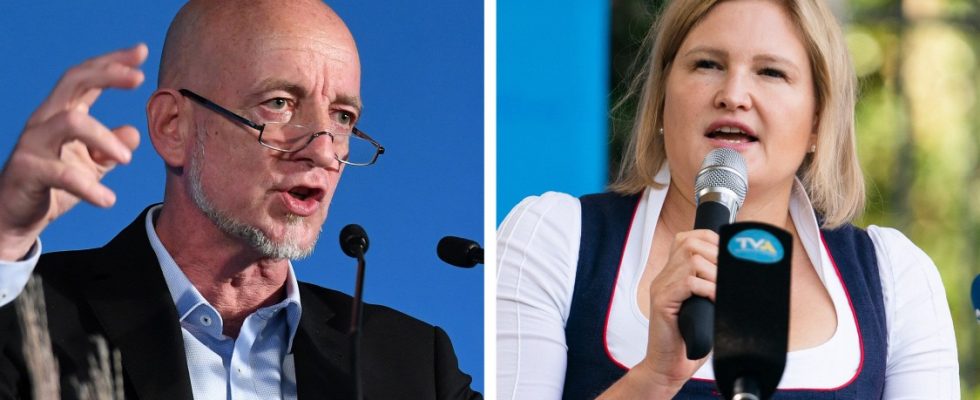The Bayern-AfD is going into the state elections on October 8 with the state parliament members Katrin Ebner-Steiner and Martin Böhm as the top candidates duo. This was decided by a majority at a state party conference on Saturday in Greding, Middle Franconia, after a long and controversial debate. Andreas Winhart, who is assigned to the so-called more moderate camp, had no chance.
The Bayern-AfD is thus continuing its ongoing course to the far right: Both Ebner-Steiner and Böhm are attributed to the officially dissolved “wing”. Ebner-Steiner in particular is considered a confidante of AfD right-wing extremist Björn Höcke from Thuringia.
Ebner-Steiner and Böhm called on their party to fight against the CSU in particular – and to unite internally. “We will not save Germany if we fight ourselves. We will save Germany if we fight our political opponents,” said Ebner-Steiner.
The Bayern-AfD – like the parliamentary group – is traditionally deeply divided: between the supporters of the “wing” and the so-called more moderate camp. Five of the initially 22 MPs have left the parliamentary group since the beginning of the legislature in 2018.
At the beginning of the party conference on Saturday, we discussed for hours whether there should be a single top candidate or maybe even a prime minister candidate, whether there should be a team made up of the seven list leaders in the government districts plus parliamentary group leader Ulrich Singer – or just a top duo. In the end, the latter proposal found the majority of the AfD members present.
As recently as this week, the faction had actually agreed to vote for a team of the seven list leaders; with parliamentary group leader Singer as a supplement, for example in national television debates. “From our point of view, it makes no sense to poster someone from Berchtesgaden to Aschaffenburg if they are not eligible for election in most of Bavaria,” said the parliamentary manager of the parliamentary group, Andreas Winhart, announcing the situation.
In the past few days, however, there has also been speculation within the AfD as to whether someone is trying to “hijack” the party conference in Greding. The AfD Bavaria does not have a system of delegates, which means that all members can come and vote at state party conferences, ultimately making decisions always imponderable. Whoever mobilizes the base can win.
The nomination of Ebner-Steiner and Böhm underlines that the camp of the formally dissolved völkisch “wing” in Bavaria can organize majorities. The camp provides numerous list leaders in the districts beyond the two, including Swabia and Lower Franconia. And indirectly it also has the say in the parliamentary group.
In the fall of 2021, the new, by their own definition, more moderate parliamentary group headed by Christian Klingen and Ulrich Singer came into office after a long dispute. At that time, she replaced the camp around the previous chairwoman Katrin Ebner-Steiner with a narrow majority. Klingen has since left the AfD. And as a result of further resignations and shifts, the “wing”-leaning camp is ahead again – it can only not take power there because of hurdles in the statutes.
Ebner-Steiner had already gained notoriety in the 2021 federal election and was even considered the figurehead of the Bavarian AfD. As a “populist in a dirndl,” as she was dubbed by the national press, she got almost 20 percent of the votes in her Lower Bavarian constituency of Deggendorf, even though she didn’t have a place on the list to get into the Bundestag. In surveys this year, the AfD has been between nine and 13 percent so far, and in the 2018 state election it had reached 10.2 percent.

